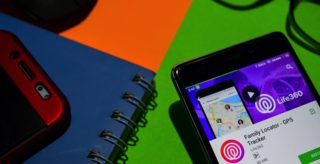Relationships
The Impact of Location-Tracking Apps on Relationships
Positive use of location-tracking demands respect, trust, and ground rules.
Posted August 13, 2019 Reviewed by Lybi Ma

Apps like Life360 and FindMyFriends are digital monitoring tools that let users see the location of family, friends or anyone, really, who agrees to allow you to track them. Life360 is like FindMyFriends on steroids, with the potential to track cell phone battery life, location history, and with a subscription, driving reports, crime alerts, and crash detection.
There's a lot of debate about the pros and cons of tracking partners, friends, and family members. From a psychological perspective, these apps force us to address issues such as desirable levels of privacy versus 'feeling watched' and the relational costs versus benefits of tracking. It all boils down to trust and ground rules.
The sales pitch for Life360, the app getting a lot of press right now, claims to bring people together. Monitoring is not the same thing as relational closeness. Apps like these are really marketing to our primal fear of uncertainty and danger in the guise of our need for connection. It offers the illusion that information will keep us safe and connected. It doesn’t address the core issues that are at risk in the act of monitoring: trust and consent.
There can be clear benefits of shared monitoring under certain circumstances, such as in amusement parks, at airports and on road trips--or when you're coordinating kids' activities and pick-ups. They can also offer a sense of security to let others know your Lyft driver deposited you safely home or that you’re late because you’re still at the office. However, before you get all excited and download this app, there are two important things to remember: 1) you can do much of this already just by texting or calling and 2) there are psychological implications to this app that, in the interest of your relational health, you need to consider and discuss so that the app is a positive contributor to your relationships and your mental health.
Big Brother or Best Friend?
Being monitored can have a wide-ranging psychological impact depending upon if we agree to be monitored or if someone demands that right or pressures us into acquiescing. Just because one person is fine with being monitored doesn't mean the other person will feel the same way.
Monitoring can expose the assumptions that people have about certain roles and behaviors. For example:
- Does a romantic relationship mean partners have the right to monitor each other’s location?
- If you are uncomfortable being monitored, does your partner see that as a lack of love and commitment? If a partner wants to monitor, do you interpret that as caring or a lack of trust? Or questions about your competence?
- Do parents have the “right” to monitor their children? If so, how much and how long? Does it make kids feel like you don’t trust their word or that they aren’t old enough to take care of themselves?
- Does being monitored by a partner make you feel cared for or spied on, creeped out or not trusted? Or that your time is no longer your own and that any deviation from 'normal' might trigger mistrust or jealousy?
- Does being monitored make you feel anxious like I’m not keeping up or doing enough? Or that I have to behave a certain way to meet others’ standards?
Social technologies have a lot of implicit assumptions that are a reflection of each person’s beliefs and experiences. With new tech, we rarely talk about what it means to use it before we jump into the fray—how could we? All this stuff is new. Consider how you attribute meaning to the length of time it takes someone to return your text, snap, message or email, or liking your Instagram pic or commenting on your Facebook post. We are social creatures and inherently attribute meaning and intention to these actions--often without checking the accuracy of these assumptions.
One of the critical things that need to be addressed, and is an important component of media literacy, is how we each make meaning out of these events, so we understand our own reactions to social media and how they influence our expectations about others.
Ground Rules for Use: Talk It Out
For relationships, this begins with conversations to explore and discuss our expectations. Do you get angry when your partner doesn’t respond to a text? Do you believe him/her when they say they didn’t see it? Before you get to the “Why didn’t you respond to my text?” conversation, how about having a conversation about what is reasonable to expect and how you feel when someone doesn’t respond?
If you can clarify the things that are useful and contributes to your relationship, such as concerns over safety, locating someone in Home Depot or seeing someone stuck at work, and the things that feel invasive and violate the sense of trust, you will be able to use these apps in very positive ways. Remember that trust is foundational to a good relationship, not location monitoring.
Tracking Kids and Teens
Parenting is harder. We all think our kids need protection, often when they don’t think they do—and sometimes when they truly don’t. Life360 COO says that most teens are OK with location sharing. I would argue that it's all in how you present it and if you've got a foundation of trust to work from. Positive use of location monitoring is just one of the many things will come out of having honest talks about technology use often and early. Monitoring all kinds of behavior, not just location, is part of parenting, but what we keep track of changes with age. Monitoring isn’t a replacement for values and critical thinking. Location tracking has to be part of a larger picture so that it makes sense to a child because the web is full of workarounds and spoofs, from phone settings to burner phones. Your role as a parent is to provide age-appropriate guidance, structure, and support. It’s not to hover and spy. Apps that are perceived as invasive and spying will drive the very activities you need to monitor underground.
Location-sharing apps can be effective when use is agreed upon collaboratively and transparently and is seen by all parties as caring, teaching, and support, not punishment and lack of trust. In all cases, its uses should be evaluated for the benefits, not for policing capabilities. Protecting teens from themselves won't be solved by an app. Consider whether or not the app gives a tween or teen the skills and support they need to be an independent adult. This may include feedback, a sense of connection, an emergency source or simply a practical tool to facilitate soccer practice pick-up.
The most important thing to remember is that these apps are not all or nothing. They can be turned on and off as fits the situation.




